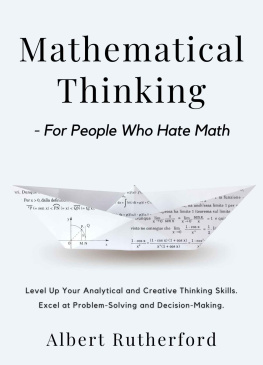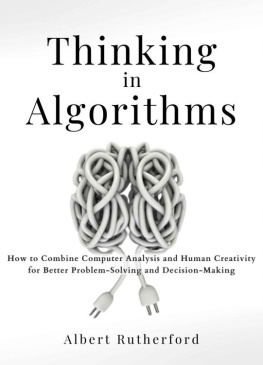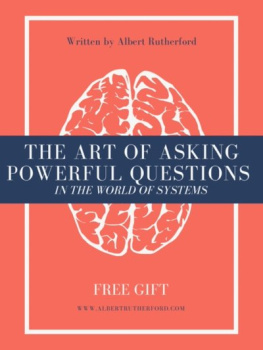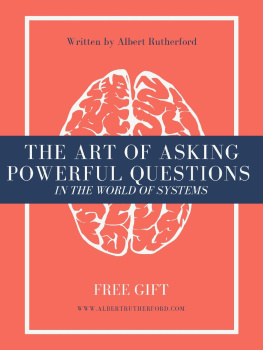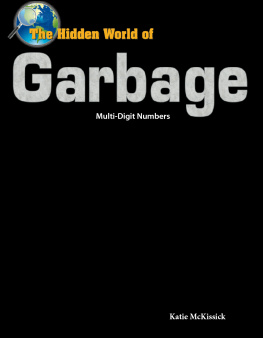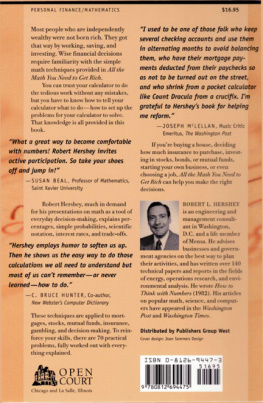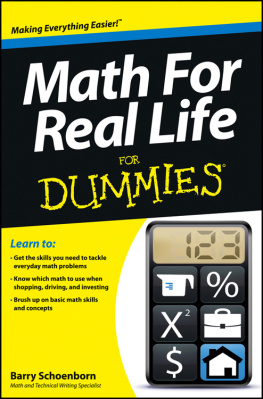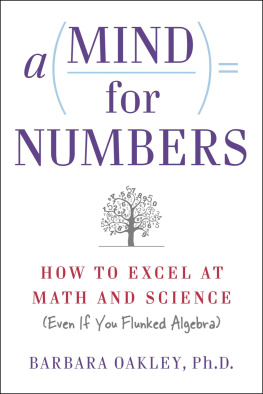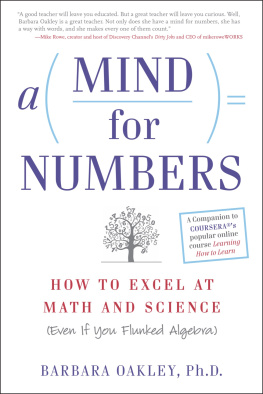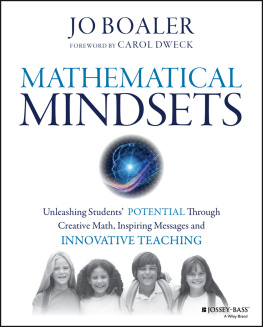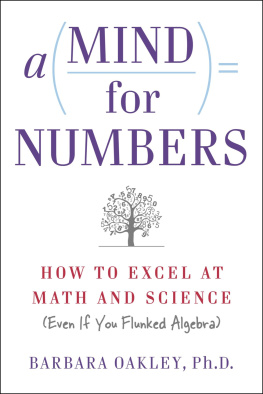| Mathematical Thinking - for People Who Hate Math: Level Up Your Analytical and Creative Thinking Skills. Excel at Problem-Solving and Decision-Making. |
| 2 of Advanced Thinking Skills |
| Albert Rutherford |
| Vibhatsu (Dec 2021) |
|
| Tags: | Mathematics, Problem, Solving, Decision, Skills, Creative, Analytical, Thinking |
| Mathematicsttt Problemttt Solvingttt Decisionttt Skillsttt Creativettt Analyticalttt Thinkingttt |
Struggling with math? Are numbers your #1 enemy?
Learn the EXACT thinking tools the top mathematicians use to utilize their math skills in real life and radically change how you shop, save, and think!
Achieve your full potential with unlocking your mathematical mind even if you think you dont have one.
Math is taught in a dull, authoritarian, and limited way. You either know how to do the Pythagorean theorem or you dont. But there is SO MUCH more to math than mere calculus and geometry. It pervades almost every life aspect from how your insurance premium is calculated to the deal you should choose on Black Friday.
Dont let numbers get in your way to succeed in life. You CAN do math without the formulas.
Learn to assess information in a logical manner, understand the real connection between risk and probability, make calculated decisions no hardcore math involved. Mathematical Thinking For People Who Hate Math provides a new way of looking at the world.
Unlock life-changing ideas and use them to make better and more informed decisions.
- Express yourself in a precise and concise manner using the language of math.
- Learn how turning your focus off can help solve challenging problems.
- How to turn risk and probability to your advantage mathematically.
- Manage test anxiety like a pro.
A math manual youll actually love to read, with research-backed examples for faster learning and greater everyday impact.
Albert Rutherford is an internationally bestselling author whose writing derives from various sources, such as research, coaching, academic and real-life experience.
Thinking mathematically is not the same as doing math. Discover the underlying, everyday utility of math they dont teach you in school.
About the Author
Albert Rutherford is an internationally bestselling author.
His books draw on various sources, from corporate system building, organizational behavior analysis, scientific research, and his life experience.
He has been building and improving systems his whole adult life and brings his proven strategies to you.
Title Page
Mathematical Thinking
- For People Who Hate Math
Level Up Your Analytical and Creative Thinking Skills.
Excel at Problem-Solving and Decision-Making.
By Albert Rutherford
www.albertrutherford.com
Copyright
Copyright 2021 by Albert Rutherford. All rights reserved.
No part of this publication may be reproduced, stored in a retrieval system, or transmitted in any form or by any means, electronic, mechanical, photocopying, recording, scanning or otherwise, except as permitted under Section 107 or 108 of the 1976 United States Copyright Act, without the prior written permission of the author.
Limit of Liability/ Disclaimer of Warranty: The author makes no representations or warranties with respect to the accuracy or completeness of the contents of this work and specifically disclaims all warranties, including without limitation warranties of fitness for a particular purpose. No warranty may be created or extended by sales or promotional materials. The advice and recipes contained herein may not be suitable for everyone. This work is sold with the understanding that the author is not engaged in rendering medical, legal or other professional advice or services. If professional assistance is required, the services of a competent professional person should be sought. The author shall not be liable for damages arising herefrom. The fact that an individual, organization of website is referred to in this work as a citation and/or potential source of further information does not mean that the author endorses the information the individual, organization to website may provide or recommendations they/it may make. Further, readers should be aware that Internet websites listed in this work might have changed or disappeared between when this work was written and when it is read.
For general information on the products and services or to obtain technical support, please contact the author.
This ePUB is reformatted and republished by Vibhatsu

Click here for your FREE GIFT: The Art of Asking Powerful Questions in the World of Systems
Content
Introduction
In classrooms across the nation, students are chewing their fingernails down the quick as they frown over their calculus homework. To them, the series of numbers and symbols on the page look like the headache-inducing language of an alien species, solving for X a nearly impossible task. In a fit of rage, they close their textbook and open a chat so they can bemoan the gratuitous torture that is math class with a friend.
This is stupid! Whats the point, anyway? Ill never use this stuff in real life!
I know right? Theres so much else we could be learning thats way more useful!
Wondering why anyone would ever go into a field that requires such nonsense, they push through the class dragging their feet and scratching their head nearly every step of the way. And when theyve reached the minimum of what their secondary school or college admissions office requires, theyll promptly strike math classes from their schedules and breathe a sigh of relief as they toss their folders full of formulas in the trash.
Its a tale as old as the modern school system. And its something nearly everyone (but, perhaps, mathematicians and scientists) can relate to. But as such young people grow into tax-paying, mortgage-borrowing, retirement-fund-owning adults, they regret having not held onto those notes longer.
Pouring over a stack of complicated forms, receipts, and spreadsheets, the math never seems to add up right. The cruel classroom exercises have become real life, with much higher stakes: balance your budget and manage your finances or sink into poverty and bankruptcy. With confidence in calculating quickly waning, they realize they never thought would dawn and wish they paid a little more attention in calculus class.
Unfortunately, theres no do-over. No time machine to take a quick trip back to that homework session years ago and tell their younger self to pay attention so they can understand the stock market later in life. And even if there was, do you think theyd listen?
With tiny powerful computers in our pockets, its hard to convince the younger crowd that taking copious calculus notes will be worth giving up a socialite Saturday afternoon. Heck, you, a distinguished grown adult, may not even be convinced yet.
Often, adults in the modern world dont need to know much math, especially if they can afford an accountant. Most get by with only the barest knowledge of addition and subtraction (if that). We live in a world that has become quite anti-math, or rather, highly user-friendly for the un-mathematical person. Restaurants print tip calculations on the bottom of receipts, computerized registers and virtual payments have eliminated the need for counting change, and a quick Google search can answer questions about the Pythagorean Theorem or definite integrals. Nowadays, there are even apps for measuring the degree of an angle or which allow you to take a picture of a complicated equation and get an answer. But all this technology does is answer the procedural side of math. And, despite common misconception, the procedural part of math is not all of math.

